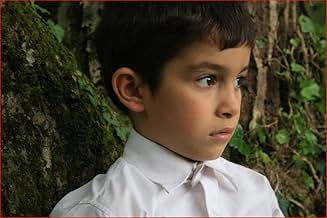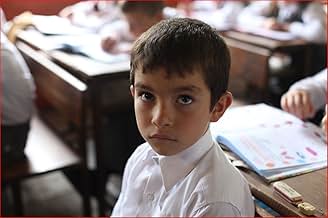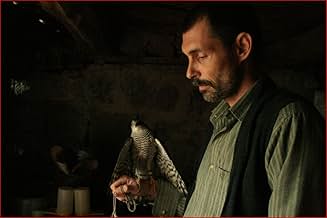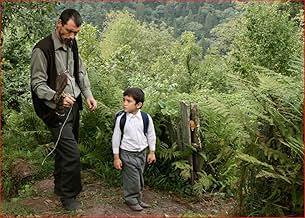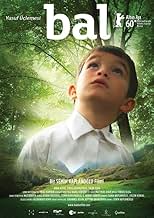NOTE IMDb
7,1/10
7,7 k
MA NOTE
La vie tranquille d'un garçon et de sa famille est menacée lorsque son père ne rentre pas à la maison après avoir récolté du miel dans la forêt.La vie tranquille d'un garçon et de sa famille est menacée lorsque son père ne rentre pas à la maison après avoir récolté du miel dans la forêt.La vie tranquille d'un garçon et de sa famille est menacée lorsque son père ne rentre pas à la maison après avoir récolté du miel dans la forêt.
- Réalisation
- Scénario
- Casting principal
- Récompenses
- 14 victoires et 15 nominations au total
Avis à la une
Bal is the Turkish word for honey, and that is part of the storyline. Yusuf, a six year old boy, wanders about, searching for both his father and the meaning of life, in no particular order.
His father suffers the trials of Job, his bees have vanished for no apparent reason and he has a family to feed. An accident leads to dads early demise, so most of the film is told from the perspective of Yusuf, who as played by Bora Atlas, is an absolute casting miracle. The kid is tremendous; he owns the screen.
There is very little dialogue, so the actors must use their faces to portray real human emotions. The scenery is beautiful and the sounds of nature fill the air. In the mood for a quiet, thoughtful movie with actual heart and soul, then Bal should be just right.
His father suffers the trials of Job, his bees have vanished for no apparent reason and he has a family to feed. An accident leads to dads early demise, so most of the film is told from the perspective of Yusuf, who as played by Bora Atlas, is an absolute casting miracle. The kid is tremendous; he owns the screen.
There is very little dialogue, so the actors must use their faces to portray real human emotions. The scenery is beautiful and the sounds of nature fill the air. In the mood for a quiet, thoughtful movie with actual heart and soul, then Bal should be just right.
beauty is the basic virtue of film. the beauty of images, the crumbs of mystery, Bora Altas are parts of this delicate, light-dark movie.a slice of pure life. that is all. and the delicate art of director to create the thirt part of a trilogy. seductive Turkish film, it is mixture of different lines of common life, religion and forms of poetry, small gestures and childhood perceptions. embroidery of signs and looks,it can have a lot of keys. but fundamental thing, the secret of this fragile construction, reflection about essential ingredients of life remains this special beauty. but it is not the unique source of fascination. because it is a correct story and each viewer has chance to discover his well known part. the school, the relation with the father, the image of mother, the wood, the different feelings, the search, the sleep and the shadows from little Heaven are drops who can make Honey a real good movie.
it is tempting to define it as art film. or as poem about life. or as masterpiece. in fact, it is only a story. a story like many others from the old times. a family. a boy. memories. and the absence. all is well known. the film is only support for remind. and each scene becomes a trip in yourself. a circle around basic truths. rediscover of the purpose of cinema. this is all. a family. a boy. the father. and the forest. like a line. letters and signs and the voice of teller. parts of reflection of world in yourself.
I had wanted to see Bal for a long tie. Finally, I watched it yesterday. Bal is an interesting movie. When a movie has very little action but keeps your attention for two hours, you develop a feeling of respect for the team who made it. You are convinced that making such a movie has lots of difficulty involved, and this mere fact evokes feelings of respect for it within you. Nevertheless, respect does not automatically bring the status of being good to it. Especially, if the movie attempts to give almost all its messages through symbols, looks and constantly rotating camera scenes, another difficulty is brought up, which, in turn, gives rise to evoking feelings of respect for it within you again. This time, the source is the fact that you feel ignorant to decode those messages. In addition, watching Bal is like viewing a Discovery Channel documentary in that the movies presents lots of scenes of both natural and man-made surroundings. However, there is a clear difference between the Discovery Channel documentary and Bal as the events made up of messages in the movie are not coherent and form a congruent story. At the end of the movie, I wanted very much to have conversations with the Jury in Berlin to have a glimpse of what they had thought in honeying Bal with a prestigious award.
Film 4 champions movies that most viewers would never otherwise have the opportunity to enjoy, let alone even know about. Therefore, they are to be congratulated and supported for showing minor gems such as 'Honey' (Bal).
A small number of films have been applauded for stripping down both pace and cinematic frills to convey a way of life. Literally, any slower and we'd be in real time! Italy's 'A Tree of Wooden Clogs' is a famous example which understandably divides opinion quite severely.
It is almost incidental as to whom, what, and where 'Bal' is set and about. It will obviously appeal to those who prefer the organic side to things in life, whether in nature, lifestyle or in the cinematic process. Bal covers all these to a generous degree.
Yes, it features throughout a six year old stammering Turkish schoolboy - Yusuf - not particularly photogenic, or cute, or naughty, or anything. Just an everyday kid who has a bee-keeping father, who doesn't actually keep bees. Well, not in any one place - he places the hides in remote and beautiful areas and then extracts the honey. His quite young (looking) dutiful mother picks tea.
I feel quite privileged to have been given a beautifully, often exquisitely, photographed study of this life and taking up just two hours of my own life. I learned much and there is a quiet story in there somewhere - you can make of it what you will, it's almost unimportant. Or is it?
I turned my hi-fi amplifier up quite high when playing the film's sound through it and would strongly suggest you do similar. The all- encompassing natural sounds are so well recorded, every nuance and snippet of sound help paint a very vivid sonic picture. You could almost close one's eyes and listen to this on its own. Almost uniquely, (and thankfully) you won't have to suffer a sudden booming beat or great crescendo of added noise to make you jump out of your skin. It would sound great with headphones, too, I'm sure (as long as you have a stereo source, of course).
Personally, I always find it comforting when a film, involving a child features a good teacher. We all know and recognise one, from our own childhoods - Yusuf's teacher is measured and fair, calm and patient, rewarding good work, dissuading bad. These scenes were an absolute pleasure.
Apparently, this is the final part in a trio of films by Turkish writer/director Semih Kaplanoglu, though chronologically, it is the first part. Naturally, now, I want to see the other two parts, 'Egg' and 'Milk'. I'm hoping that Film 4 will be showing these, too, at some point.
A small number of films have been applauded for stripping down both pace and cinematic frills to convey a way of life. Literally, any slower and we'd be in real time! Italy's 'A Tree of Wooden Clogs' is a famous example which understandably divides opinion quite severely.
It is almost incidental as to whom, what, and where 'Bal' is set and about. It will obviously appeal to those who prefer the organic side to things in life, whether in nature, lifestyle or in the cinematic process. Bal covers all these to a generous degree.
Yes, it features throughout a six year old stammering Turkish schoolboy - Yusuf - not particularly photogenic, or cute, or naughty, or anything. Just an everyday kid who has a bee-keeping father, who doesn't actually keep bees. Well, not in any one place - he places the hides in remote and beautiful areas and then extracts the honey. His quite young (looking) dutiful mother picks tea.
I feel quite privileged to have been given a beautifully, often exquisitely, photographed study of this life and taking up just two hours of my own life. I learned much and there is a quiet story in there somewhere - you can make of it what you will, it's almost unimportant. Or is it?
I turned my hi-fi amplifier up quite high when playing the film's sound through it and would strongly suggest you do similar. The all- encompassing natural sounds are so well recorded, every nuance and snippet of sound help paint a very vivid sonic picture. You could almost close one's eyes and listen to this on its own. Almost uniquely, (and thankfully) you won't have to suffer a sudden booming beat or great crescendo of added noise to make you jump out of your skin. It would sound great with headphones, too, I'm sure (as long as you have a stereo source, of course).
Personally, I always find it comforting when a film, involving a child features a good teacher. We all know and recognise one, from our own childhoods - Yusuf's teacher is measured and fair, calm and patient, rewarding good work, dissuading bad. These scenes were an absolute pleasure.
Apparently, this is the final part in a trio of films by Turkish writer/director Semih Kaplanoglu, though chronologically, it is the first part. Naturally, now, I want to see the other two parts, 'Egg' and 'Milk'. I'm hoping that Film 4 will be showing these, too, at some point.
Le saviez-vous
- AnecdotesThe poem that a female student reads aloud and which Yusuf listens to is a Turkish translation of Arthur Rimbaud's "Sensation."
- ConnexionsFollows Yumurta (2007)
Meilleurs choix
Connectez-vous pour évaluer et suivre la liste de favoris afin de recevoir des recommandations personnalisées
- How long is Honey?Alimenté par Alexa
Détails
Box-office
- Budget
- 1 250 000 € (estimé)
- Montant brut mondial
- 1 381 730 $US
- Durée
- 1h 43min(103 min)
- Couleur
- Mixage
- Rapport de forme
- 1.85 : 1
Contribuer à cette page
Suggérer une modification ou ajouter du contenu manquant

![Regarder Trailer [OVS]](https://m.media-amazon.com/images/M/MV5BMjkyOGM4YzMtYWY3ZS00NTkzLWJmOWYtNzQ2MzEzYzg2MDc2XkEyXkFqcGdeQXRyYW5zY29kZS13b3JrZmxvdw@@._V1_QL75_UX500_CR0)
